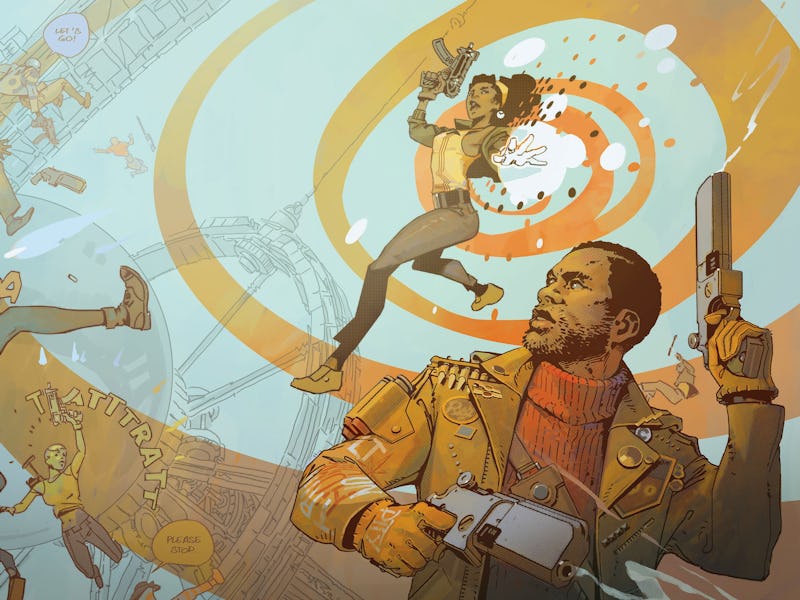Deathloop ending explained: Why the worst gaming trope of 2021 needs to die
We’re left feeling gross, rather than satisfied.

Video games can't resist a dramatic secret identity reveal, but two of 2021's most-hyped games — Deathloop and Twelve Minutes — feature the same baffling twist: characters who are romantically (or sexually) involved with a close relative. It’s a strange, disturbing trope made even stranger by the fact that the two most popular instances are all about time loops.
Two disappointing twists
Twelve Minutes tries to be profound and sophisticated but ends up being disappointing, with a priority on shock-factor.
Deathloop and Twelve Minutes debuted in 2021 and have way more in common than you might think. Twelve Minutes is an interactive narrative adventure, and Deathloop is a first-person shooter. In both cases, the main male character is stuck in a time loop, and the player must unravel the core mystery to stop the cycle.
It’s a pretty basic premise that has been explored in games and film before. When done right,, it can be an effective way to tell a story, especially if the ending pays off. In games, the time loop can also work in conjunction with the gameplay in ways that make sense.
Spoilers for Deathloop and Twelve Minutes ahead.
In Deathloop, protagonist Colt wakes up on a beach, reliving the same day over and over again while being taunted by Julianna, a mysterious woman who knows more than she lets on.
In Twelve Minutes, a husband and wife are attacked by a police officer, and they’re all stuck in a cycle, repeating every — you guessed it — 12 minutes. You play as the husband who must figure out the meaning of the loop while preventing the cop from killing you and your wife.
The problem is that both have disappointing, yet disturbing endings that lean into shock-factor instead of featuring a satisfying conclusion. Both games use incest as the big reveal, but it feels lazy and disappointing in both instances.
Colt is Julianna’s father, and yet they spend much of Deathloop’s runtime flirting and trying to kill one another. In Twelve Minutes, it’s eventually revealed that the husband and wife are actually siblings and the wife is pregnant.
We have so many questions, and the most important is, “Why?”
Shock factor as a cheap storytelling tactic
The intriguing premise of Deathloop collapses on itself after most of the questions it poses aren’t answered.
Those twists are shocking, sure, but that doesn’t mean they’re good. Especially in games with such an interesting premise, it’s all the more disappointing when the surprise endings are so half-baked. It’s as if you’re meant to be so shocked, you might fail to realize a lot of the plotholes sprinkled throughout.
At the end of both games, you end up just feeling dirty, especially since the two pairs of characters are so sexually entwined. That skeevy feeling is more prominent in Twelve Minutes, of course, since the wife is pregnant, but Deathloop has its fair share of sexual hints, as well. There’s an exchange in Deathloop that alludes to Julianna being aware of Colt’s apartment, implying the two had a “date” in a previous loop.
It seems like the writers of both stories couldn’t figure out a meaningful, satisfying way to wrap things up. The weight of such a complex idea — the time loop — falls apart across both games, due to their horrific endings.
In Deathloop, especially, many of the game’s most burning questions aren’t answered. For instance, Julianna’s motivations aren’t necessarily clear. Colt was a deadbeat dad who left Julianna, so she’s out for revenge ... by trapping her father in an endless, incestuous time loop. Is she just looking to torture Cole? That’s certainly what it seems like, but it’s a motivation that’s hard to get behind, especially with all the weird flirting going on.
While Twelve Minutes does a better job of explaining things, the delivery of the incestuous themes is much more graphic and disturbing. Throughout the game, you must drug your wife/sister to solve puzzles, with no option to skip it or come up with a different plan. It’s clear the game is meant to be thought-provoking and edgy but comes across as shocking for no reason.
We’ve seen enough of the “whoops, you’re actually related, despite flirting (or worse)” twist numerous times before and it’s time to retire it. It’s almost always done in poor taste, leaving the player disappointed and grossed out. Hopefully, there are fewer taboos in 2021’s remaining big games.